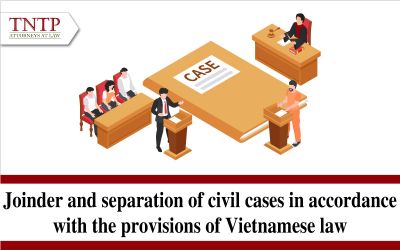
Dispute settlement and Debt collection

Introduction about TNTP
TNTP & Associates International Law Firm (“TNTP”) is a Law Firm specializing in providing legal services in Vietnam. With steady bravery and years of professional experience, lawyers and consultants working at company as well as TNTP is becoming a reliable, familiar partner of many enterprises, organizations and individuals.
“Legal knowledge – The way leading to success”. With this motto, we have constantly improved professional knowledge as well as skills in the fields of dispute settlement, debt collection recovery and legal consultants. Thanks to the unremitting efforts, until now, we have provided legal services and related services in many fields for big clients in Vietnam, especially in the field of Dispute settlement and Debt collection.
Dispute settlement and Debt collection
Dispute Settlement
Dispute settlement is that individual, organization request the competent authority, organization to consider and issue decision to resolve contracditions, disagreements arisen in the fields of business, commerce and life in general on the basis of reviewing documents, evidences in the case, thereby protecting legal rights and benefits of individuals, agencies, and organizations.
Dispute settlement’s skills which TNTP aims to are negotiating in the spirit of cooperation, protecting the best Client’s benefit, professional manners and quick, efficient resolution time.
Legal Consulting Services
Whenever the Clients have legal issues that need advice and solution, TNTP will be dedicated to providing effective legal advice to the Clients. Accordingly, the Clients will be ensured of optimal rights and benefits in the process of operating enterprises, organizations, or personal issues; always be comfortable and have the best experience when using TNTP’s legal consulting services.
Debt Collection
Debt collection and recovery is the process of requesting the obliged party to pay the money, property to the entitled party when it is due but the obliged party does not execute the payment as agreement in contract or in other forms.
With experiences and professional knowledge in debt collection, TNTP always improves skills of consulting, reviewing risks of debt collection ability and assisting the Client in negotiating with related parties, representing the Client to work with the competent authorities on the basis of protecting the Client’s rights in Vietnam.
service quality
200 +
300 +
70% +
15 +
GET ADVICE FROM A LAWYER
What do TNTP customers say?

At TNTP, I not only have a lawyer dedicated to his work but also a friend and sincere companion in difficult times.
Nguyễn Huy Hoàng
Chairman of the Board of Directors, Getfly Enterprise Management Technology Joint Stock Company

TNTP International Law Firm and Associates (“TNTP”) has provided us with legal services in finance, securities and commercial dispute resolution with a dynamic, responsible and enthusiastic team. TNTP has provided professional advice, timely and accurate advice and has been a reliable legal advisor in our financial field. We are very satisfied with the quality of TNTP’s services.
Phạm Hồng Vương
Phó Tổng Giám đốc, Deputy General Director, Hoa Binh Securities Joint Stock Company (“HBS”)


